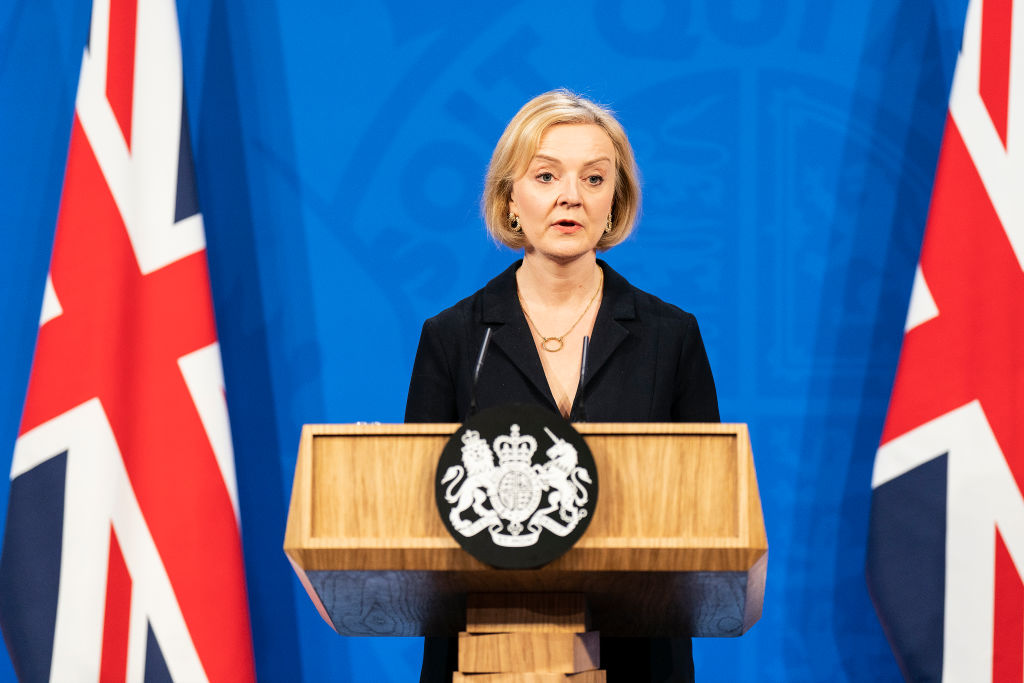Britain's Liz Truss tries to calm markets, save her job with new treasury secretary, budget U-turn


A free daily email with the biggest news stories of the day – and the best features from TheWeek.com
You are now subscribed
Your newsletter sign-up was successful
British Prime Minister Liz Truss, in her first substantive act as Britain's leader, unveiled dramatic tax cuts in a mini-budget released Sept. 23. The markets hated her combination of steep tax cuts and higher spending in a period of high inflation, the British pound fell to a record low against the dollar, government borrowing costs shot up, and Truss' approval rating plummeted into single digits. The Bank of England had to step in to prop up financial markets.
On Friday, Truss sacked her treasury secretary and longtime ally, Kwasi Kwarteng, the coauthor of her supply-side budget. She replaced him with Jeremy Hunt, a former health secretary and foreign secretary who has supported her rival, Rishi Sunak, in the Conservative Party leadership race to replace ousted Prime Minister Boris Johnson.
Truss had already dropped some of her proposed tax cuts, and Hunt suggested over the weekend he will toss the rest of her keystone budget plans. With markets still jittery, Hunt will release an interim statement Monday laying out new budget priorities, ahead of a longer mid-term budget update Oct. 31.
The Week
Escape your echo chamber. Get the facts behind the news, plus analysis from multiple perspectives.

Sign up for The Week's Free Newsletters
From our morning news briefing to a weekly Good News Newsletter, get the best of The Week delivered directly to your inbox.
From our morning news briefing to a weekly Good News Newsletter, get the best of The Week delivered directly to your inbox.
"There has to be, in a pretty short time, an apology and a fundamental reset of the government by the prime minister," Conservative lawmaker Robert Halfon said Sunday. "The government has looked like libertarian jihadists and treated the whole country as kind of laboratory mice to carry out ultra, ultra free market experiment."
"Truss is still prime minister in name, but power in government has shifted to Hunt," The Associated Press reports. Hunt said on Sunday that Truss is "in charge," adding, "She's listened. She's changed. She's been willing to do that most difficult thing in politics, which is to change tack." But the Conservatives have to decide if Truss is permanently damaged goods in the eyes of the voters. Her party currently has a substantial majority in Parliament, but "polls suggest an election would be a wipeout for the Tories, with the Labour Party winning a big majority," AP notes.
"This is a hand-to-mouth government, living hour by hour," BBC political editor Chris Mason wrote Monday. "If you pick up the hint of panic in the air, you're right, too." Monday's statement by Hunt "is about two things. Restoring the government's financial credibility. And propping Liz Truss up in office," Mason adds. "Both remain imperiled and no one can be quite certain what will happen next."
A free daily email with the biggest news stories of the day – and the best features from TheWeek.com
Peter has worked as a news and culture writer and editor at The Week since the site's launch in 2008. He covers politics, world affairs, religion and cultural currents. His journalism career began as a copy editor at a financial newswire and has included editorial positions at The New York Times Magazine, Facts on File, and Oregon State University.
-
 Why is the Trump administration talking about ‘Western civilization’?
Why is the Trump administration talking about ‘Western civilization’?Talking Points Rubio says Europe, US bonded by religion and ancestry
-
 Quentin Deranque: a student’s death energizes the French far right
Quentin Deranque: a student’s death energizes the French far rightIN THE SPOTLIGHT Reactions to the violent killing of an ultraconservative activist offer a glimpse at the culture wars roiling France ahead of next year’s elections
-
 Secured vs. unsecured loans: how do they differ and which is better?
Secured vs. unsecured loans: how do they differ and which is better?the explainer They are distinguished by the level of risk and the inclusion of collateral
-
 TikTok secures deal to remain in US
TikTok secures deal to remain in USSpeed Read ByteDance will form a US version of the popular video-sharing platform
-
 Unemployment rate ticks up amid fall job losses
Unemployment rate ticks up amid fall job lossesSpeed Read Data released by the Commerce Department indicates ‘one of the weakest American labor markets in years’
-
 US mints final penny after 232-year run
US mints final penny after 232-year runSpeed Read Production of the one-cent coin has ended
-
 Gopichand Hinduja and the rift at the heart of UK’s richest family
Gopichand Hinduja and the rift at the heart of UK’s richest familyIn The Spotlight Following the death of the patriarch, the family’s ‘Succession-like’ feuds are ‘likely to get worse’
-
 Warner Bros. explores sale amid Paramount bids
Warner Bros. explores sale amid Paramount bidsSpeed Read The media giant, home to HBO and DC Studios, has received interest from multiple buying parties
-
 Gold tops $4K per ounce, signaling financial unease
Gold tops $4K per ounce, signaling financial uneaseSpeed Read Investors are worried about President Donald Trump’s trade war
-
 Electronic Arts to go private in record $55B deal
Electronic Arts to go private in record $55B dealspeed read The video game giant is behind ‘The Sims’ and ‘Madden NFL’
-
 New York court tosses Trump's $500M fraud fine
New York court tosses Trump's $500M fraud fineSpeed Read A divided appeals court threw out a hefty penalty against President Trump for fraudulently inflating his wealth
